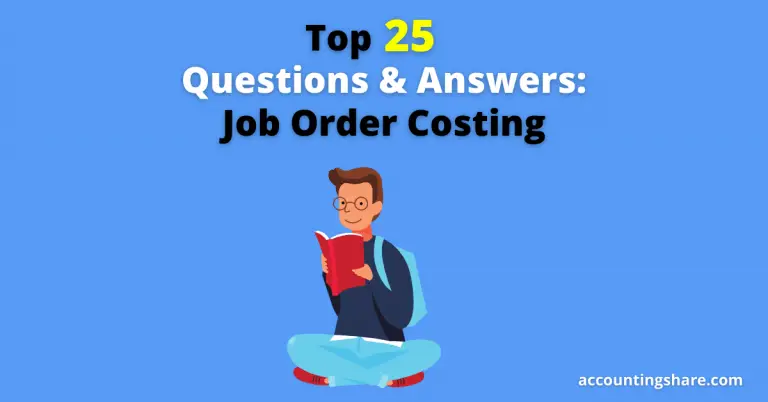Top 25 Questions and Answers: Introduction to Management Accounting [With PDF]
Today, we will be learning about the Top “25” Questions and Answers: Introduction to Management Accounting. Please read it with proper concentration from top to bottom. You’ll get a basic idea of the Introduction to Management Accounting.
By understanding these key questions and answers, you will be better equipped to apply management accounting principles in real-world scenarios. This knowledge will give you a competitive edge in your career and help you make informed decisions in a business setting.
Let’s begin now.
Questions and Answers: Introduction to Management Accounting
Question 01: What is management accounting?
Answer: Management accounting is a process of business and operational costs analysis to prepare internal financial reports and records. And the decision-making process aid managers in achieving business targets.
Question 02: What is financial accounting?
Answer: Financial accounting is the process of summarizing, analyzing, and reporting financial transactions related to a business.
Question 03: What is cost accounting?
Answer: The process of recording, classifying, analyzing, summarizing, and allocating various alternative measures for cost management is known as cost accounting.
Question 04: What is a management audit?
Answer: The management audit is a systematic examination of the management’s decisions and actions to analyze the performance.
Question 05: What is the main objective of management accounting?
Answer: Provide accounting information for internal users within the company.
Question 06: What is the purpose of management accounting?
Answer: The purposes of management accounting are
- Decision Making
- Budgeting and forecasting
- Interpretation of Data
- Reporting
- Controlling the business.
Question 07: What are the consequences of management accounting in a modern business?
Answer: The consequences of management accounting in a modern business are as follows:
- Managing the business
- Forecasting
- Budgeting process
- Reduce expenses
- Improve cash flow
- Increase financial results
- Taking business decisions
Question 08: What is the scope of management accounting?
Answer: The following facts of management accounting indicate the scope of the subject.
- Financial Accounting
- Cost Accounting
- Budgeting and Forecasting
- Cost Control Procedure
- Statistical Methods
- Legal provisions
Question 09: What are the commonly used techniques in management accounting?
Answer: The following are the techniques commonly used in management accounting:
- Financial Statement Analysis
- Fund Flow Analysis
- Cash Flow Analysis
- Costing Techniques
- Budgetary Control
- Responsibility Accounting
- Management reporting
Question 10: Who are the users of managerial accounting information?
Answer: Individuals within an organization are the users of managerial accounting information.
Question 11: What is the nature of management accounting?
Answer: Management accounting uses past and present cost data to forecast and make future decisions.
Question 12: Are there any legal requirements to prepare reports in management accounting?
Answer: No. There are no legal requirements to prepare reports in management accounting.
Question 13: What are the roles of management accounting in an organization?
Answer: The roles of management accounting are as follows:
- Achieve their objectives or goals
- Formulate policy
- Monitor and assess the performance.
- Plan for the future period
- Solve a variety of problems in a practical scenario.
Question 14: What does ethics mean?
Answer: Ethics is a philosophical branch that includes the systematization, defense, and recommendation of concepts of right and wrong behavior.
Question 15: What are the ethical responsibilities of management accounting?
Answer: The following are the ethical responsibilities of management accounting:
- Competence
- Confidentiality
- Integrity
- Objectivity
Question 16: What is the value chain?
Answer: The value chain is a set of activities carried out by a company operating in a specific industry to provide the market with a valuable product or service.
Question 17: What is the budget?
Answer: A budget is a financial plan that outlines expected income and expenses for a specified period, typically a year.
Question 18: What is the full meaning of IMA and CMA?
Answer:
IMA = Institute of Management Accountants.
CMA = Certified Management Accountant
Question 19: What is a performance report?
Answer: A performance report is a report on the performance of a specific aspect or entity.
Question 20: What is decision-making?
Answer: Decision-making is the cognitive process of choosing between different courses of action.
Question 21: What is budgetary control?
Answer: Budgetary control includes making budgets, comparing actual results with planned budgets, figuring out any differences between actual results and planned budgets by calculating variances, and taking the necessary steps to fix those differences.
Question 22: What are the full forms of JIT, TOC, and TQM?
Answer:
JIT = Just in Time
TOC = Theory of Constraints
TQM = Total Quality Management
Question 23: What is benchmarking?
Answer: Benchmarking involves comparing an organization’s processes and metrics with industry best practices to identify areas for improvement.
Question-24: What do you mean by total quality management?
Answer: Total Quality Management (TQM) aims to create an environment where an organization can consistently deliver high-quality products and services to clients.
Question 25: What does the theory of constraints (TOC) mean?
Answer: The theory of constraints identifies and improves the main limiting factor hindering the achievement of an objective.
I hope, at the end of the article, you have a basic idea about the introduction to management accounting.
Regularly review the Introduction to Management Accounting questions and answers to enhance your accounting abilities and understanding.
You may also read:







